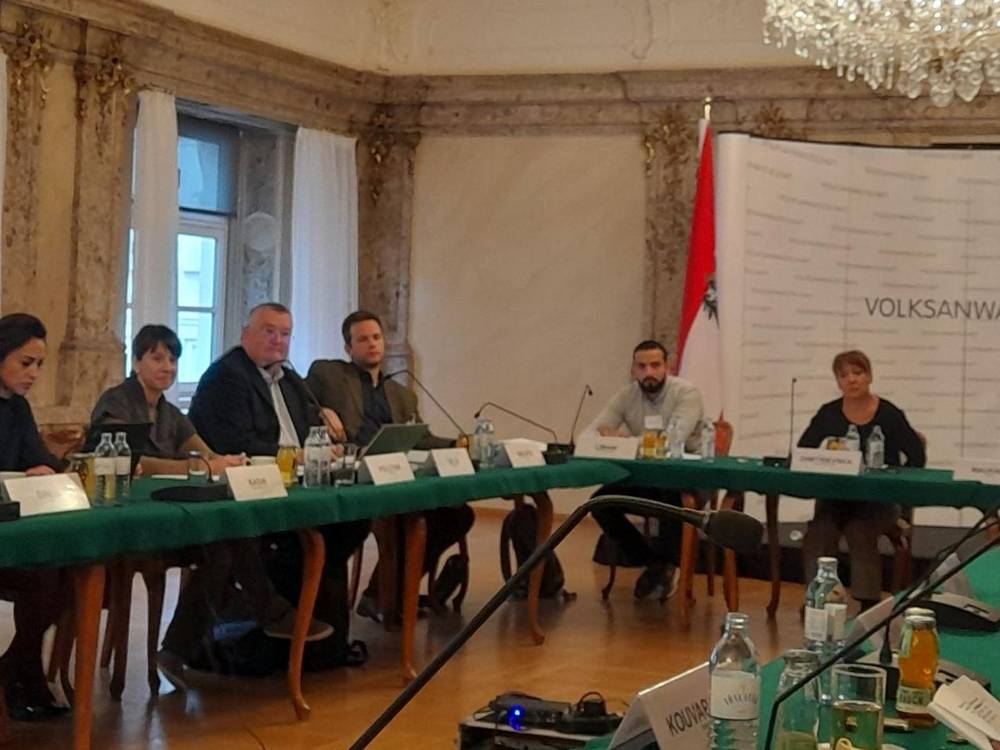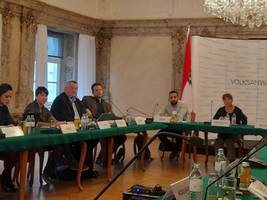The deputy Ombudsman Ivan Šelih, who is also the head of the National Preventive Mechanism (NPM), and the Ombudsman’s advisor Ana Polutnik, an NPM member, attended a conference of the National Preventive Mechanisms (NPM) Network for South-East Europe (SEE NPM Network) that took place in Vienna on 15 and 16 November 2022. Participants at the conference discussed dealing with children and adolescents who have problems with mental health, and mental and physical development, and the use of coercive measures.
The Ombudsman’s advisor Ana Polutnik presented the experiences of Slovenia’s NPM from visits to institutions that accommodate children and adolescents with mental health and developmental problems. Meanwhile, the deputy Ombudsman Ivan Šelih provided some details from individual cases, and described the recommendations given by the NPM for visiting these institutions.
Ana Polutnik stressed that the Ombudsman has insisted for many years that children in psychiatric hospitals must not be treated in wards under special supervision, together with adult patients. As a result of these efforts, the Unit for Intensive Paediatric and Adolescent Psychiatry – a part of the Ljubljana Psychiatric Clinic – was founded in March 2019. The NPM, which has visited the Unit twice so far, finds it has been fully occupied almost all the time. “Special protective measures (SPM) – the physical restraining of patients using straps – are implemented in the Unit. They are implemented in line with the Mental Health Act (ZDZdr) in cases when other (softer) ways of calming patients are not possible or are not effective. In the course of our visits we found that the SPM last between one and two hours, and are rarely employed. We also found that employees respect the provisions of the Mental Health Act when implementing SPM. We nevertheless recommended that the Unit takes special care when filling out the forms on the use of SPM, especially in the part where the situation that led to SPM being implemented is described. We also suggested that the form should include a section for noting which measures were used after the end of SPM, when the physical restraints were removed (e.g. therapeutic conversations between the patient and doctor).”
The conference was also presented with the NPM’s visits to institutes for education, work and care, where the NPM finds that the personal freedom of the children, adolescents and adults who reside in these institutions is often limited, that SPM are implemented, and that there are no legal bases for these restrictions.
“Centres for children and adolescents with emotional and behavioural problems are also encountering an increasing number of children with mental health problems, serious behavioural difficulties, and various associated problems; children and adolescents are frequently violent to staff and other children, and there are also many cases of self-harm. These children frequently require more help or more intensive treatment, so centres are opening so-called intensive groups to address this need. The NPM has on a number of occasions called on the Ministry of Labour, Family, Social Affairs and Equal Opportunities to help centres set up intensive groups and also create programmes for dealing with children in these groups.” Crisis centres for children and adolescents are also facing similar situations and difficulties, so the state’s action is essential, emphasised the deputy Ombudsman Ivan Šelih and the Ombudsman’s advisor Ana Polutnik.
At the end of the conference, the representatives of the NPM for South-East Europe adopted conclusions and recommendations. They emphasised that persons with mental health problems or problems with mental and physical development, especially children and adolescents who experience such problems, enjoy special protection, and that coercive measures in all circumstances for all these particularly vulnerable groups may only be used on the basis of law and in accordance with national and international standards. They also stressed that all coercive measures may only be used as extreme measures (after the use of so-called de-escalation techniques), and for the shortest duration possible. The coercive measures employed must also be the subject of internal review and external control as soon as possible after the incident. Representatives of the NPM for South-East Europe concluded that a care assistant or nurse must be present all the while a coercive (physical) measure is being implemented, and that all coercive measures must be appropriately documented
Conference of the National Preventive Mechanisms (NPM) Network for South-East Europe on children suffering from mental health and developmental problems, and the use of coercive measures

Photo gallery
(1)
